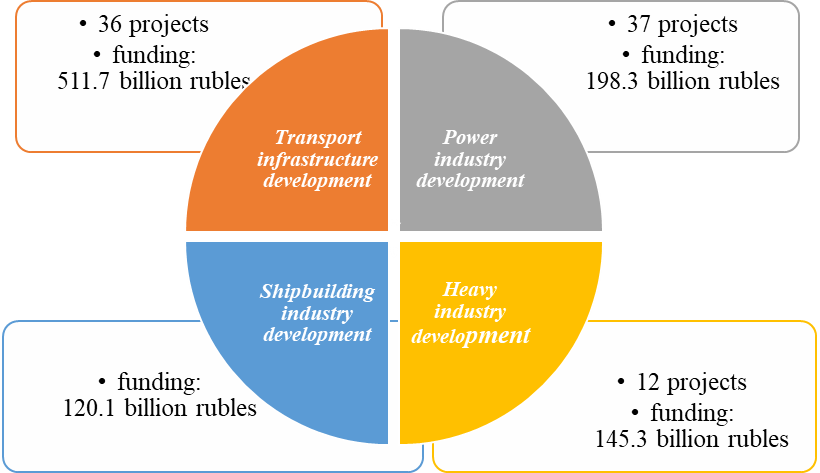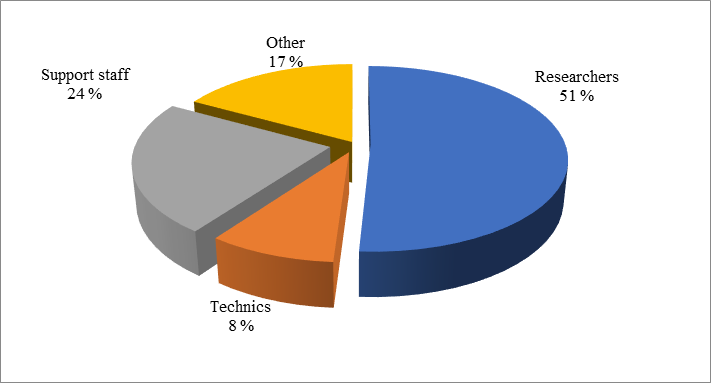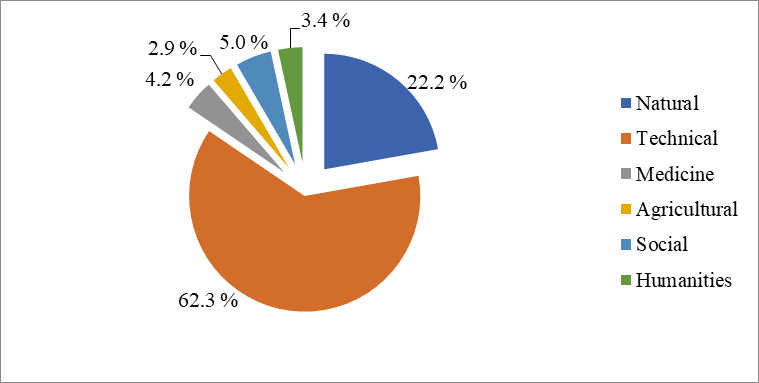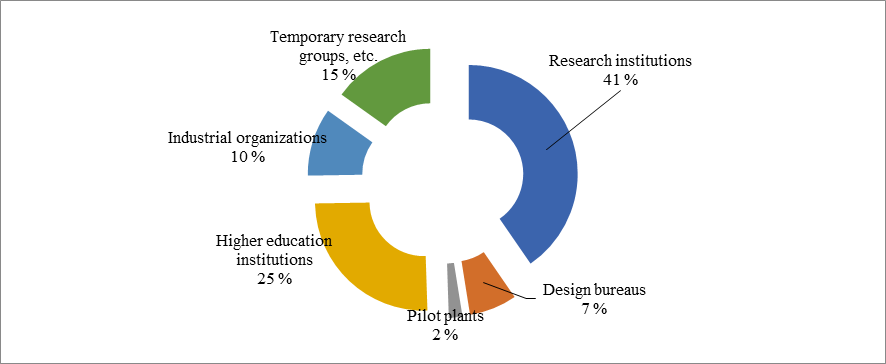Abstract
This article investigates the notion of a country's intellectual capacity and its components, which is a result of innovative, cognitive, and scientific research activities of the society. We demonstrate that the demand in, and relevance and availability of the Russian intellectual resources, along with their compatibility with scientific and technical achievements and the possibility of its application in practical projects can significantly facilitate the solution of production and infrastructure problems in the Russian Arctic. We present some development projects for the Arctic as a region of Russia's strategic economic and geopolitical interests. The Arctic territories where production and infrastructure projects are being implemented lack sufficient resources, including the intellectual ones, that are necessary to complete these projects. The problem of developing the Russian Arctic can only be solved at the government level by allocating all necessary resources. To solve the production and infrastructure problems of the Russian Arctic, it is necessary to attract intellectual resources from all over the country. All of this makes our research relevant: its goal is to assess the scientific and organizational factors that facilitate the formation and development of intellectual capacity in modern-day Russia with a view to their application for solving practical production and infrastructure in the Russian Arctic.
Keywords: Intellectual capacity, intellect product, the Arctic
Introduction
Currently, the academic community, politicians, business people, and authorities of all levels are discussing the trends of crisis development in Russia and the ways out of it. In our research, we shall focus on one of the anti-crisis management aspects: the engagement of Russia’s intellectual capacity for the solution of production and infrastructure problems in the Arctic.
The necessity to change the extractive character of the Russian economy is stressed by both the academic community and the country's authorities of the highest level, which is especially important from the point of view of implementing a new regional policy. In this respect, the full use of the country's intellectual resources to solve specific problems, including those associated with production and infrastructure, become especially poignant.
Problem Statement
Within recent years, the Arctic region of the Russian Federation has been closely observed by scientists, politicians, and entrepreneurs who see it as a base for social and economic development. The Arctic regions do not have sufficient resources, including the intellectual ones, to support this development. That is why to solve the production and infrastructure problems of the Russian Arctic, it is necessary to attract intellectual resources from all over the country.
Research Questions
The components of a country’s intellectual capacity
Intellectual capacity as a conceptual category is initially personified and in its narrowest, original sense, it characterizes the cognitive and creative abilities of an individual (McPhail, 2009). That is why this category can be often found in medicine articles that evaluate human's ability to perceive reality and properly react to the perceptions (Metcalfe et al., 2020; Zmigrod et al., 2019). In recent years, however, the concept of intellectual capacity has been used to characterize various social and economic phenomena: organizations, territories, society as a whole, etc.
Within the scope of the research presented here, we focus on the intellectual capacity of a country. By nature, it is the integrated scientific knowledge. We claim that a country's intellectual capacity is primarily characterized by being based on renewable and increasing resources, namely the population's knowledge and intellect.
We made out and named three components of a country’s intellectual capacity:
- the scientific and technological capacity is encapsulated in technologies, equipment, and other material results of human activities;
- the bibliographic capacity represents informational resources in material (paper) or virtual (digital) form; the bibliographic capacity includes patents, analytical materials, databases, academic articles, reports, monographs, etc.
- the shared background knowledge of the population is the encyclopedic store, total acquired knowledge of people belonging to one social and economic community, the aggregate of knowledge that creates conditions for the successful social and economic development of the society.
A number of researchers outlined the significance of the ‘genetic pool of a society’ that can predetermine the nation's innate ability to intellectual development (Foroudi et al., 2020; Silviana, 2019). Researchers also note that in the end, a country's intellectual capacity depends on the system of education and enlightenment that forms its scientific worldview (Secundo et al., 2020). The scientific worldview is the basis of the shared background knowledge of a country's populace. The development level of sciences is also very important, especially of the applied ones that are closely connected to production industries (Marcin, 2013). This is due to the fact that the fundamental theoretical advanced find their practical representation through the methods of applied sciences and transform into projects solving production and infrastructure problems.
Production and infrastructure development projects in the Russian Arctic
As of today, about 200 production and infrastructure projects are being implemented in the Russian Arctic. The key projects are implemented in the Arctic territories of the North-Western, the Ural, and Siberian Federal Districts of the Russian Federation (Korchak et al., 2019). The total amount of funding for production and infrastructure projects exceeds a trillion rubles. About 400 billion rubles have been allocated for these purposes from the federal budget. The Arctic regions where the projects are being implemented contributed about 21 billion rubles. Over 580 billion rubles have been attracted from off-budged sources. The funding structure for production and infrastructure development projects in the Russian Arctic is shown in Figure 1.

The study of the problems of the Arctic, including those carried out by the authors of this article, shows that the Arctic regions where the projects are being implemented lack the financial, labor, and intellectual resources to solve production and infrastructure problems on their own (Bazhutova et al., 2020; Samarina et al., 2020). That is why to solve the production and infrastructure problems of the Russian Arctic, it is necessary to attract intellectual resources from all over the country.
Purpose of the Study
The assessment of the scientific and organizational factors that facilitate the formation and development of intellectual capacity in modern-day Russia with a view to their application for solving practical production and infrastructure in the Russian Arctic.
Research Methods
The scientific methods used for the study of applying intellectual capacity to solving practical production and infrastructure problems are just at the beginning of their development. The determination of scientific and organizational factors facilitating the formation and development of modern Russia’s intellectual capacity play a special role in this respect.
To define the existing labor resource structure in intellectual capacity formation and development, the proportions were calculated of such categories as ‘researchers’, ‘technicians’, ‘supporting personnel’, and ‘others’ within the entire personnel involved in research and development, and the researches were subdivided according to their area of work;
To describe the organizational powers for the formation and development of Russia’s intellectual capacity, we determined the structure of organizations conducting scientific research and development.
The assessment of the scientific and organizational factors that facilitate the formation and development of intellectual capacity with a view to their application for solving practical production and infrastructure in the Russian Arctic makes this research a cross-disciplinary one.
This research drew materials from the Government Statistics Board of Russia (GosKomStat, 2018), National Research University Higher School of Economics (Gokhberg et al., 2019).
Findings
Intellectual capacity is a result of innovative, cognitive, and scientific research activities of the society. As we mentioned before, it includes the scientific, technological, and bibliographic capacities, as well as the shared background knowledge. The demand in, and relevance and availability of the Russian intellectual resources, along with their compatibility with scientific and technical achievements and the possibility of its application in practical projects can significantly facilitate the solution of production and infrastructure problems in the Russian Arctic.
Within a market economy, the implementation of intellectual capacity results in a ‘smart product’, a special commodity with fundamentally new and useful consumer properties. Let us note that this special type of commodity has a dialectical nature. On the one hand, it is created for sales, exchange, or any other types of commodity relations, just like any other product. Therefore, its market launch must lead to profits or the compensation of costs (Nemlioglu, 2019). On the other hand, the ‘smart product’ is a means of personal self-expression and it can be distributed for free (Lai et al., 2020).
The key factors include funding, state management, and organization, as with the solution of any other large national-level problems associated with production and infrastructure. There are, however, other important components. In our research, we outline the scientific and organizational factors facilitating the formation and development of modern Russia’s intellectual capacity.
Firstly, the existing structure of labor resources engaged in the formation and development of intellectual capacity (Fig. 2).

There is a robust basis for the formation and development of intellectual capacity in Russia. As of 2018, the number of employees engaged in research and development in Russia equaled 708 thousand people. Out of those, the number of researchers, who create most of the intellectual developments, was 360 thousand people or 51 %. Even though the number of researchers reduced by more than half since the pre-reform year of 1990, the remaining lot still allows for maintaining leadership in key areas of knowledge-intensive and innovative production. One of the positive factors for the formation of intellectual capacity is the significant proportion of younger researchers aged under 39: there are 158 thousand of them or 44 % of the entire number of researchers. The average age of researchers is 47 years (Gokhberg et al., 2019).
Concerning the solution of production and infrastructure problems of the Russian Arctic, the distribution of researchers across the areas of knowledge is especially important (Fig. 3).

As we can see, the largest proportion of Russian researchers (62.3 %) is in technical sciences. This facilitates the growth of the scientific and technological sectors of intellectual capacity.
The proportion of technical personnel that plays a big role in promoting production capacities in terms of innovative products and technologies among those engaged in research and development equaled 9 % or 64 thousand people. We must note that the reduction in the number of technicians was the most significant. The flaws in reforming Russian academia had a strong negative impact on the reproduction of highly qualified technical personnel. As compared to 1990, their number reduced almost three times.
The structure of labor resources involved with the formation and development of Russia's intellectual capacity, in general, resembles that of the economically developed countries (Rusu-Tanasă, 2015).
Secondly, the organizational resource for the formation and development of Russia’s intellectual capacity is represented by almost 4000 organizations conducting scientific research and development. The structure of these organizations is shown in Figure 4.

The structure analysis for the organizations involved with the development of smart commodities showed significant disproportions. The largest portion of research works is carried out in research institutions (41 %). This leads to a certain detachment of the theoretical developments from their practical implementation in production and infrastructure projects. In other Arctic states, a lot more research and development work is done by venture companies, design bureaus, pilot plants, and industrial organizations (Silva et al., 2017). It is, however, favorable for the formation of the intellectual capacity that a quarter of research and development works are conducted in higher education institutions. This value increases every year.
Russia has no other way except the incremental and sustainable development of the Arctic since this region is of some strategic, economic, and geopolitical interest to the country. The problems of development and infrastructure in the Russian Arctic can only be solved at the government level by allocating all necessary resources. The country's intellectual capacity may have a special role in this respect. Our research confirms that there are favourable research and organizational conditions in today's Russia that would facilitate the formation and development of its intellectual capacity.
Conclusion
1. Intellectual capacity, comprising scientific, technological, and bibliographic capacities as well as the shared background knowledge is a result of innovative, cognitive, and scientific research activities of the society. The demand in, and relevance and availability of the Russian intellectual resources, along with their compatibility with scientific and technical achievements and the possibility of its application in practical projects can significantly facilitate the solution of production and infrastructure problems in the Russian Arctic.
2. As of today, about 200 production and infrastructure projects are being implemented in the Russian Arctic. These projects target the development of transport infrastructure (35 projects), power industry (37 projects), mining and processing industries (12 projects); and shipbuilding. The total amount of funding for production and infrastructure projects exceeds a 1000 billion rubles.
3. The key projects are implemented in the Arctic territories of the North-Western, Ural and Siberian Federal Districts of the Russian Federation. The study of the problems of the Arctic shows that the Arctic regions where the projects are being implemented lack the financial, labor, and intellectual resources to solve production and infrastructure problems on their own. That is why to solve the production and infrastructure problems of the Russian Arctic, it is necessary to attract intellectual resources from all over the country.
4. Our research confirms that there are favorable research and organizational conditions in today's Russia that would facilitate the formation and development of its intellectual capacity. These include the existing structure of labor resources involved in the formation and development of intellectual capacity and the presence of 4000 organizations conducting research and development work.
Acknowledgments
The study results obtained in the performance of the Russian Science Foundation project № 19-18-00025.
References
Bazhutova, E., Skufina, T., & Samarina, V. (2020). Entrepreneurial Activity of the Russian Arctic Regions: Quantitative Assessments and Management. Proc. of the Int. Sci. and Technol. Conf. FarEastСon 2019. Smart Innovation, Systems and Technologies, 172, 189–200.
Foroudi, P., Akarsu, T. N., Marvi, R., & Balakrishnan, J. (2020). Intellectual evolution of social innovation: A bibliometric analysis and avenues for future research trends. Industr. Market. Manag., 7, 124–131.
Gokhberg, L., Ditkovskiy, K., & Diachenko, E. (2019). Science and Technology Indicators in the Russian Federation-2019: Data Book. HSE.
GosKomStat (2018). Federal State statistics service of the Russian Federation. http://www.gks.ru/
Korchak, E. A., Serova, N. A., Emelyanova, E. E., & Yakovchuk, A. A. (2019). Human capital of the Arctic: Problems and development prospects,. IOP Conf. Ser. Earth and Environ. Sci., 302(1).
Lai, H., Maskus, E. K., & Yang, L. (2020). Intellectual property enforcement, exports, and productivity of heterogeneous firms in developing countries: Evidence from China. Europ. Econ. Rev., 123, 103373.
Marcin, K. (2013). Intellectual Capital as a Key Factor of Socio-economic Development of Regions and Countries. Proc. Econ. and Finance, 6, 288–295.
McPhail, K. (2009). Where is the ethical knowledge in the knowledge economy?: Power and potential in the emergence of ethical knowledge as a component of intellectual capital. Critical Perspect. on Account., 20(7), 804–822.
Metcalfe, D., McKenzie, K., McCarty, K., & Murray, G. (2020). Screening tools for autism spectrum disorder, used with people with an intellectual disability: A systematic review. Res. in Autism Spectrum Disorders, 74, 101549.
Nemlioglu, I. (2019). A Comparative Analysis of Intellectual Property Rights: A case of Developed versus Developing Countries. Proc. Computer Sci., 158, 988–998.
Rusu-Tanasă, M. (2015). Intellectual Capital a Strategic Factor of Socio-Economic Development of Regions and Countries. Proc. Econ. and Finance, 27, 369–374.
Samarina, V., Korchak, E, Skufina, T., & Samarin, A. (2020). Social problems of the Russian Arctic’s mono-towns: How to resolve them? TEST Engineer. and Manag., 82, 3534–3545.
Secundo, G., Ndou, V., de Vecchio, P., & de Pascale, G. (2020). Sustainable development, intellectual capital, and technology policies: A structured literature review and future research agenda. Technol. Forecast. and Soc. Change, 153, 119917.
Silva, M. C., Gavião, L. O, Gomes, C. F. S., & Lim, G. B. A. (2017). A proposal for the application of multicriteria analysis to rank countries according to innovation using the indicators provided by the World Intellectual Property Organization. RAI Revista de Administração e Inovação, 14(3), 188–198.
Silviana, B. G. (2019). Intellectual Assets Management Model. Proc. Manufactur., 32, 1064–1068.
Zmigrod, L., Zmigrod, S., Rentfrow, P. J., & Robbins, T. W. (2019). The psychological roots of intellectual humility: The role of intelligence and cognitive flexibility. Personal. and Individ. Differences, 14115, 200–208.
Copyright information

This work is licensed under a Creative Commons Attribution-NonCommercial-NoDerivatives 4.0 International License.
About this article
Publication Date
17 May 2021
Article Doi
eBook ISBN
978-1-80296-106-5
Publisher
European Publisher
Volume
107
Print ISBN (optional)
-
Edition Number
1st Edition
Pages
1-2896
Subjects
Science, philosophy, academic community, scientific progress, education, methodology of science, academic communication
Cite this article as:
Samarina, V. P., Samarin, A. V., & Skufina, T. P. (2021). Russia’s Intellectual Capacity For Solving Production And Infrastructure Problems In The Arctic. In D. K. Bataev, S. A. Gapurov, A. D. Osmaev, V. K. Akaev, L. M. Idigova, M. R. Ovhadov, A. R. Salgiriev, & M. M. Betilmerzaeva (Eds.), Knowledge, Man and Civilization - ISCKMC 2020, vol 107. European Proceedings of Social and Behavioural Sciences (pp. 1386-1393). European Publisher. https://doi.org/10.15405/epsbs.2021.05.183

